From the June 2008 Issue Biodiesel Magazine
Malaysian palm oil conference focuses on sustainability
By Susanne Retka Schill
The word “sustainability” is no longer a catchphrase but a global market requirement for the palm oil industry. “The world now demands palm oil that is certified and produced sustainably,” said Peter Chin Fah Kui, the Malaysian minister of plantation commodities and industries, in his opening address at the International Palm Oil Sustainability Conference on April 14 in Sabah, Malaysia.
“The challenges created by globalization and the increased demand for natural resources call for additional and different types of intervention. Collaboration between the different actors and stakeholders targeting a balance between sustainable production, trade and consumption is a key element in innovative approaches, and how this will impact the environment.”
The Malaysian Palm Oil Council hosted the inaugural conference, which brought together more than 500 industry players from Southeast Asia, Australia, Europe and the United States to discuss the emerging issues surrounding sustainability.
Speakers addressed corporate social responsibility, new certification requirements, wildlife conservation, life cycle analysis and carbon balance, among other topics. At the opening ceremonies, Chin officially announced the formation of the Malaysian Palm Oil Wildlife Conservation Fund, a collaborative effort of the Malaysian government, the Malaysian Palm Oil Council, Bursa Malaysia (representing the country’s financial market) and the Borneo Conservation Trust.
One of the first efforts for the $6.25 million research and conservation fund will be to survey the orangutan population in the Malaysian state of Sabah on the island of Borneo. Sabah is the No. 1 palm-producing state in Malaysia and also home to significant populations of orangutans in remnants of virgin tropical rain forests.
Chin said the Malaysian palm oil industry has been under a shadow for too long. “The cultivation of palm oil generally gives the world an impression that large tracts of virgin rain forests are bulldozed and cleared to make way for our plantations,” he said.
“Palm oil cultivation in Malaysia is strictly regulated, can only be developed on legally designated agricultural land and does not encroach on protected virgin rain forests.” He called for conference attendees to dispel the myths and misinformation surrounding the palm oil industry, “and highlight the sustainability of the palm oil industry, compared to other oilseed crops and agricultural practices around the globe.”
MPOC Chairman Lee Oi Hian echoed Chin’s emphasis on sustainability. “The demand and expectation of customers for sustainable palm oil are all familiar to us,” he said in his opening remarks at the conference. “This is our single most important current challenge or threat.” Malaysia is the world’s largest exporter of palm oil and follows Indonesia as the world's second-largest producer of palm oil.
Dedicated to helping save orangutans and their forest homes.
Something to think about
Never doubt that a small group of thoughtful, committed citizens can change the world. Indeed, it's the only thing that ever has.
Margaret Mead
Margaret Mead
Abuse and humiliation of orangutans stopped?
Good news. From March 29 2010 the use of orangutans in circus-like shows in Malaysia has been officially banned. Let us know at once if you see anyone breaking this law....this animal park was caught doing so by Nature Alert.
SHAME ON MALAYSIA
The government owned Melaka Zoo forces this orangutan to take part in degrading and inhumane shows. Note the lack of hair on this orangutan's arms and lower body.
Information is power, when put to good use.
If you find what you see here to be interesting, do you think some of your friends might also like to know more about orangutans?
Please could you invite as many people as you can to visit this blog and subscribe to the news posts? As you can see and read, orangutans need all the help they can get.
Many thanks.
Nature Alert
Please could you invite as many people as you can to visit this blog and subscribe to the news posts? As you can see and read, orangutans need all the help they can get.
Many thanks.
Nature Alert
Nine years secured to a three metre chain. Imagine if you will.
"Mely" enjoying fruit supplied by COP and Nature Alert.
Waiting to be rescued
Under lock and chain for at least nine years.
How governments do deals which wreck environments, people and countries
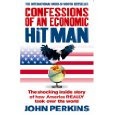
Highly Recommended reading and available from Amazon
Chained up day and night.
But confiscated and rescued by COP in January 2010.
COP to the rescue
The final moments before being released forever from the heavy chain around its neck.
A helping hand
After maybe nine years of being confined to a wooden crate this orangutan is now on the way to a rescue centre and one day back to the forest.
SOMETHING TO THINK ABOUT
What changes the world for the better is the passion of certain individuals, not governments, not big organisations.
Paul Watson
Sea Shepherd
Highly Recommended Book
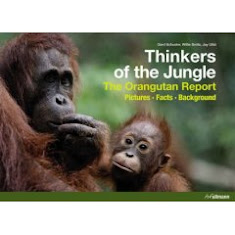
Available from Amazon and by far the best book ever written on orangutan conservation.
Hall of Shame for President Susilo Bambang Yudhoyono and the Palm Oil Industry.
Nothing can prepare one for the sight of the systematic extermination of orangutans by the government of Indonesia.
Look at the photos and news articles on these pages in the context of a statement the President made to the media on 10th December 2007.
“In the last 35 years about 50,000 orangutans are estimated to have been lost as their habitats shrank. If this continues, this majestic creature will likely face extinction by 2050,” President Susilo Bambang Yudhoyono said at the launch of an orangutan conservation plan at the climate talks in Bali.
“The fate of the orangutan is a subject that goes to the heart of sustainable forests … To save the orangutan we have to save the forest.”
Statements like these are most welcome, but unless backed up by action, such words fall on deaf ears within the Ministry of Forestry....who are busy granting licences to cut down the very forests the President says they should protect!
Look at the photos and news articles on these pages in the context of a statement the President made to the media on 10th December 2007.
“In the last 35 years about 50,000 orangutans are estimated to have been lost as their habitats shrank. If this continues, this majestic creature will likely face extinction by 2050,” President Susilo Bambang Yudhoyono said at the launch of an orangutan conservation plan at the climate talks in Bali.
“The fate of the orangutan is a subject that goes to the heart of sustainable forests … To save the orangutan we have to save the forest.”
Statements like these are most welcome, but unless backed up by action, such words fall on deaf ears within the Ministry of Forestry....who are busy granting licences to cut down the very forests the President says they should protect!
Another palm oil victim - one of tens of thousands - so far.
For a close up of this brutally treated orangutan, please see below.
Mother shot and eaten. Baby beaten and tied to a pole.
The plight of a baby orangutan rescued from a palm oil plantation workers in Borneo has exposed the high price these endangered primates are paying for the production of palm oil. The 2-3 year old female was found hogtied to a pole and had clearly been brutally beaten. Covered in cuts and bruises, she was also severely dehydrated and emaciated after being starved for days or even weeks.
Palm oil kills - no doubt about it.

Villagers protest against palm oil companies.
Tropical forest, home to orangutans etc.
Threatened by palm oil companies.
Saved by COP

Mother murdered by palm oil company
Tortured by palm oil company employees

Rescued and treated by COP, this orangutan has since been released back into a forest.
Palm oil plantation victim
Orphaned by a palm oil company with help from the government of Indonesia.
Indonesia's Alcatraz for orangutans
A living hell for this orangutan.
Guilty of being an orangutan
A prisoner held by the Indonesian government
Shame on the Ministry of Forestry
A life behind bars. Why?
Day after day, 24/7 ..........
A magnificent male orangutan facing life imprisonment behind bars.
Kept prisoner in filth and squalor
Things just go from bad to worse
Solitary confinement .
There can be no excuse for treating an orangutan like this.
Welcome to Indonesia
Where orangutans are incarcerated by the government.
No hope?
Has this orangutan lost the will to live?
Shame on Minister Kaban
Young orangutan in a 1.5 sq. metre cage 24 hours a day and tormented by zoo visitors.
What future do you think this orangutan has?
How much longer can the Indonesian government carry on abusing and killing orangutans?
Born in the wild.
Life behind bars - where the government of Indonesia prefers to see its orangutans.
Dying for help
With their mothers slaughtered these baby orangutans face a life of torment, torture and hunger, thanks to the government of Indonesia.
Torture chambers for orangutans at an Indonesian zoo

These orangutans have been kept like this for nine months. Until Nature Alert and COP protested the cages were left outside in all weathers.
Solitary confinement courtesy of Indonesian zoo

Caged like this 24/7 for nine months, with no end in sight.
When you think you are to busy to help, please could you reflect for a moment on .........
The following extract refers to environmental problems in general. I just hope you find it as thought provoking and relevant to orangutans as I have.
"This is such a shocking and unpalatable fact that most people deny it, or they just don't want to think about it. They believe as individuals, they can do little about it, so push it to the back of their minds. But I can't do that.
When something has to be done, we need to do it. It doesn't matter how big the challenge is or how hard the solution; if I know something is wrong, and I am in a position to help, I will do my best to make it right." Duncan Bannatyne, successful British businessman.
Formerly home to orangutans and other wildlife.
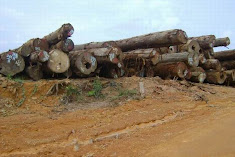
Part of the price we all pay for palm oil.
Can you see the rainforest?
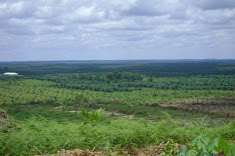
No? That's the way the palm oil companies like to see things.
Begging for food - not for fun.

Reduced to begging for food, this orangutan (one of two) is in a unofficial zoo in West Kalimantan. Their enclosure has nothing but bare earth, no protection from a blisteringly hot sun, a concrete tube to shelter/sleep in and no fresh water to drink.
Bored and hungry - for as long as this orangutans lives

Born to be free. Imprisioned for life.
The COP Rapid Response Team

Their arrival in a remote village often generates a lot of interest. Please see July 2008 Blog page for more details..
Saved by COP

Please see July 2008 Blog page for more details.
Mother killed and her baby tied up like this for six months.
We found her at the home of a family who had bought her from her mothers killer. Please see photo immediately below - she is now safe, rescued by COP with the local Forestry Police.
Safe and sound - now
Saved by The Centre for Orangutan Protection and its sponsors/supporters.
Another palm oil victim

Rescued by COP and The Borneo Orangutan Survival Foundation
With its mother killed this orangutan's new owner keeps it chained up.
A baby orangutan with nowhere to go. A mother's love replaced with a chain.
How very, very sad.

What hope is there for this orangutan?
In this small crate there really is an orangutan.

Torture takes many different forms when it comes to dealing with orangutans.
Alone and abused.

Yes. There is an orangutan in this cage.
Chained to, rather than living in a tree.

There's no escape.
At a West Borneo amusement park.

Look at the rubbish this orangutan has to live with.
Escape is not an option.

same as picture below.
Yet another victim of logging and/or palm oil.

Alone, malnourished and very sad in a transit centre.
Palm oil companies take everything.
Imagine; this was once a rainforest.
Life imprisonment
Five adult orangutans are crammed into this dark, featureless cage in a zoo. All five began life in the wild.
Orphaned by loggers or palm oil companies - often the same thing.
Missing its mother. Look at her eyes and you have to wonder what she is thinking don't you? STOP PRESS this baby has since died.
A little light refreshment goes a long way.
Water melon was always a firm favourite of the orangutans. In all the differnt locations we never once saw fresh drinking water provided.
A Tasty treat
Everywhere we went we took lots of different fresh fruit to give to the hungry orangutans we always discovered in various locations.
Same location as above.
We provided food and some small branches, and they loved both.
Again, the same location
We hope we made him a little happier than he appears. The lives of these two orangutans must be almost unbearable. We hope to arrange their transfer to a rescue centre soon.
West Kalimantan (Indonesian Borneo)
Two young orangutans kept at an amusement park. They were wild born. Mothers killed by loggers.
Rescued last year and now at a rehab. centre with an uncertain future.
This baby saw her mother being killed and eaten.
Lawbreakers
Illegal loggers
The torture of orangutans is seemingly never ending.
With its left arm chained and padlocked to its neck, this orangutan is literally being tortured at an amusement park in West Kalimantan (Borneo)
Awaiting rescue from what was once its home.
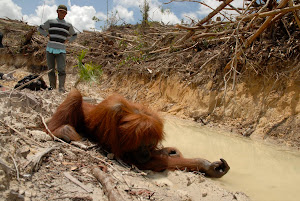
With nowhere left to run, this tranquillized orangutan was rescued and moved to another forest.
Apocalypse now - Indonesian style with help from Malaysian companies.
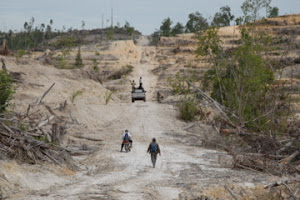
Rescuers looking for orangutans made homeless by a palm oil company. Virgin rainforest recently stood where there is nothing but a few small trees remaining, which by now will also have been cleared away. Nov. 2007
Yet another palm oil victim
-a.jpg)
With its mother killed, this baby with an injured eye was caged by workers until rescued by WWF Indonesia.
Illegal loggers in action. October 2007

Access to log these trees illegally was gained via a palm oil plantation road. This forest is home to 50 orangutans and palm oil companies want to log it.
The road to ruin - Indonesia style.
Where once stood a magnificent rainforest full of wildlife.
Mother and baby orangutan.
Oil palm companies have killed thousands like these two.
Palm oil victim. Mother killed.
This baby will have seen its mother slain.
Nothing, absolutely nothing, left of the forest, except for its soil.
It's all about money, greed and corruption.
Destruction and desolation as far as the eye can see
So much for Borneo's rainforests - look what palm oil companies have done to them.
They can barely cut down and remove the trees quick enough for their liking.
Palm oil companies destroy rainforests.
Freshly cut trees
These trees could end up as garden furniture in your local store.
Not a tree in sight - courtesy of oil palm companies.
Oil palm plants growing where rainforest once stood.
Web site to check out
How and where to watch orangutans
About Me
Blog Archive
-
▼
2008
(781)
-
▼
May
(105)
- Sime Darby`s investment in Indonesia reaches US$1....
- Australia gives $4.5m for foreign forests
- Response from Unilever
- Major forest fires in sight as more hotspots detected
- Illegal logging trade forces jungle brothel in Ind...
- Clean hair or clean air?
- UNILEVER COMMITS TO CERTIFIED SUSTAINABLE PALM OIL
- Indonesia's Astra Agro Plans to Boost Palm Oil Output
- Chainsaw threat to great apes
- Orangutans' foster mother ecourages her brood to g...
- Malaysian palm oil conference focuses on sustainab...
- BKSDA officials named suspect in Riau forest funds...
- BKSDA officials named suspect in Riau forest funds...
- EC-RI FLEGT project takes journalists to Danau Sen...
- The abuse goes on and on, and on .....
- Orangutan making money for media companies
- North Sumatra again blanketed in haze
- Govt plans estate for downstream palm oil industry
- SE Sulawesi agency seizes illegal timber from 3 ships
- The Indonesian Government plans to increase its pa...
- Indonesia considering mandatory use of biofuel
- Greepeace encourages sustainable growth of palm oi...
- Tortured displays
- First Lady and Forestry Minister honoured for tre...
- Tortured displays
- Illegal Logging Eradication: Supreme Court Termina...
- Orangutans fight for their survival on a protected...
- Certified Non-Rain Forest Palm Oil Set For Germany
- Massive media coverage of the palm oil industry wi...
- Recent video film.
- Medco invests around US$1 bln to diversify business
- North Sumatra`s Walhi reports forest conversion to...
- Company exec acquitted of illegal logging charges ...
- RI opts for carbon trading over halting deforestation
- United Tractors plans to spend $170 million on coa...
- Seized logs abandoned
- First Lady, forestry minister honored for tree pla...
- Stars support graft fight
- Tropical deforestation is 'one of the worst crises...
- Wildlife populations 'plummeting'
- Riau to invite foreign investment in plantation, f...
- Govt eyes wood products certification body
- Bakrie to expand oil palm plantation area
- Charles urges forest logging halt
- Sainsbury's first with sustainable palm oil
- Unilever takes the lead to stop deforestation in I...
- United Plantations Q1 earnings up 194%
- New Britain doubles profit from palm oil
- Indonesian forests to be more than just carbon sinks
- International Paper Threatens to Violate Own Polic...
- Joint move against log thieves
- KPK in Riau for inquiry audit
- Police back Tempo in logging libel suit
- National Geographic
- Govt urged to review forest concessions in Riau
- Indonesian Warship Captures Boat Carrying Illegal ...
- Lawmaker Grilled in Forest Graft Case
- Indonesia Losing US$16 bln Per Year By Natural Res...
- KPK, Riau Police Cooperate To Tackle Illegal Loggi...
- Riau Police Chief Replaced, KPK to Probe Illegal L...
- Indonesia Adopts Stringent "Green" Palm Oil Standard
- Malaysia Will Not Protect Officials Involved in Il...
- KPK forestry inquiry heats up
- Singapore's Wilmar Q1 net profit jumps 7 times
- Palm oil firms vow to stop using forests
- PROTECTED AREAS USED TO EXPAND INDONESIAN OIL PALM...
- Forest conversions stand: Ka'ban
- MALAYSIA'S SITT TATT IN JV TO BUILD PALM OIL MILLS...
- PALM OIL DRIVES ORANG-UTAN TO EXTINCTION
- A Helping Hand
- Centre for Orangutan Protection - in Action
- Orangutan rescue
- Riau regent accused of stealing Rp 1.2t
- Businessmen admits paying Batam authorities to use...
- Lawmaker grilled in forest graft case
- RI forest conversions alarming: Greenomics
- Conservationists say Indonesian orangutans face ex...
- Speaker : Malaysia not to protect officials involv...
- Police detain Greenpeace activists dressed as oran...
- Conservationists say Indonesian orangutans face ra...
- Palm oil wiping out key orangutan habitat: activists
- Orangutan habitat in peril due to palm oil plantat...
- Orangutan endangered in Indonesia
- Indonesia adopts stringent "green" palm oil standard
- Neste filling station closed by anti-palm oil demo...
- Ministry, USAID team up for conservation project
- Khir: No logging on my watch
- We did not approve logging in forest reserve, says...
- ILLEGAL LOGGING MAY CAUSE FARMERS TO LOSE PADI CROP
- Orangutans in danger of dying out
- RI forest conversions alarming: Greenomics
- Big Plans for Biodiesel Stall in Southeast Asia
- Foster forest concept, community-based reforestation
- Forest Crimes: Political will is needed
- China farms the world to feed a ravenous economy
- Police recover more logs in Riau; foil smuggling i...
- Illegal loggers push anti-graft police chief shuffle
- Unilever palm oil policy wins fans
- Crackdown on traffickers strains Thailand's wildli...
- Crackdown on traffickers strains Thailand's wildli...
-
▼
May
(105)
Recommended Viewing and Reading
- Guidebook to the Gung Leuser National Park
- Book: The Lizard King
- BOOK: Confessions of an Economic Hit Man